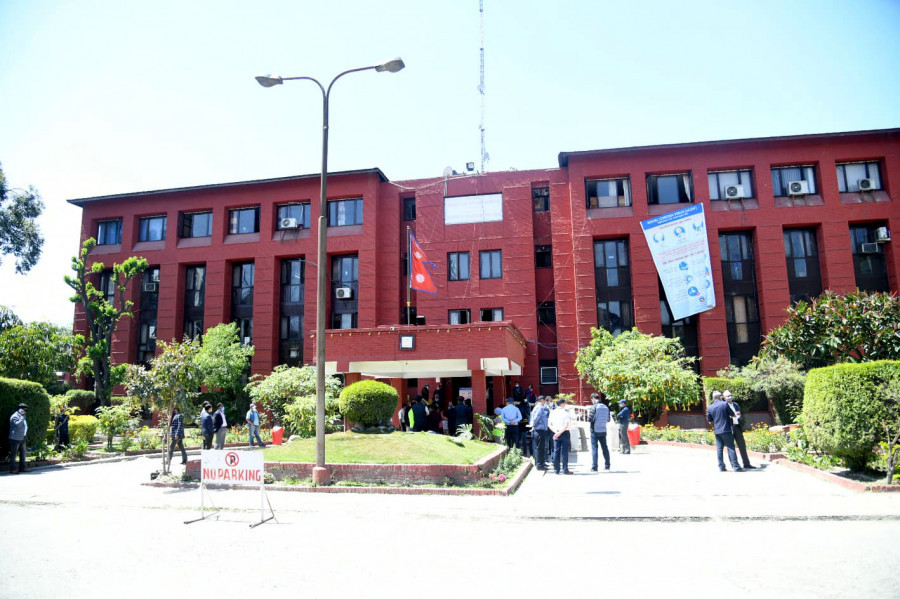Health
With state-run hospitals overwhelmed, government permits private hospitals to admit patients
Public health experts say that the government should not shun its prime responsibility of protecting the people.
Arjun Poudel
At the Narayani Hospital in Birgunj, all 63 isolation and seven intensive care unit beds and three ventilators are being used to treat Covid-19 patients.
Due to the lack of beds at the hospital, over 100 people who tested positive for the disease, are isolating themselves at home, said Vijaya Kumar Sarawagi, mayor of Birgunj Metropolitan City.
But the number of coronavirus cases in the city and the whole of Parsa district continues to rise. Fifty-three new cases were reported in the district on Thursday alone.
“We are not in a position to do anything, as the state-run hospital has already been overwhelmed,” Sarawagi told the Post. “Neither the federal government, nor the provincial government have helped us [arrange more beds].”
As state-run hospitals around the country such as Narayani get overwhelmed with Covid-19 patients, the Ministry of Health and Population has decided to allow private hospitals to treat patients infected with Covid-19 and charge them for their services.
But experts have criticised the decision saying that it is against the spirit of the constitution, which guarantees the right to health for all citizens, regardless their economic status.
“We have decided to allow those who can afford private care and are willing to pay to opt for private hospitals,” Dr Jageshwor Gautam, spokesperson for the ministry, told the Post. “The government won’t even reimburse private hospitals that treat Covid-19 patients, who can’t afford to pay.”
Gautam said that private hospitals can charge asymptomatic patients up to Rs 3,500 per day; patients with mild symptoms Rs 7,000, and serious patients Rs 15,000. The hospitals can also perform polymerase chain reaction tests on their own and charge an additional 10 percent to the Rs5,500 test charge fixed by the ministry.
Public health experts also allege that the government ended the lockdown throughout the country in haste. The number of positive cases, along with those with severe symptoms, started to surge after the government ended the lockdown.
Madan Upadhyay, medical superintendent at Narayani Hospital, said, “The number of symptomatic cases is rising these days.”
“Of the total patients admitted to the hospital, over 80 percent are symptomatic and some are in serious condition.”
According to Upadhyay, a 36-year-old man who returned from Bangalore on July 8 saw his health condition deteriorate after staying in quarantine for five days. He was admitted to the ICU of Narayani Hospital on July 13 after complaining of breathing difficulties, fever and cough and cold.
The man was placed in ventilator support the next morning, but he succumbed to the disease in the afternoon.
Experts say that the government should not shun its responsibility to protect the people. “We should not forget that most of the Covid-19 patients are migrant workers who have returned from abroad, and their family members, who can’t afford to pay,” said Dr Baburam Marasini, former director at the Epidemiology and Disease Control Division, said.
“Authorities should focus on building new facilities to isolate infected people. It will be too risky to allow them to go home.”
Experts also said that all citizens, regardless of their economic status, should be provided treatment. “The government should provide treatment to all those who show Covid-19 symptoms, except for those who prefer private care on their own,” said Dr Bhagwan Koirala, chairman of Nepal Medical Council, the national regulatory body of medical doctors. “I believe that the government won’t refrain from its prime responsibility.”
When asked about Birgunj’s situation and if the poor people who can’t afford to pay for private care will be left to die, Gautam said that the government is capable of arranging isolation beds, intensive care units and ventilators. “There is no problem in Birgunj,” said Gautam.
“We are setting up isolation beds there. If the number of cases rises, authorities will take them [the sick] to other places. We have 10,000 isolation beds throughout the country.”
However, such claims are neither supported by the ministry’s own data nor by mayor Sarawagi account.The ministry’s data shows that there are only 6,671 isolation beds across the country.
“Cases are exploding in our metropolis, but we are not in a position to bring the infected people to isolation centers,” said Sarawagi.
“The chief minister of our province came yesterday and asked us to find a place to construct isolation centers. This is akin to digging a well after a fire.”




 14.24°C Kathmandu
14.24°C Kathmandu















